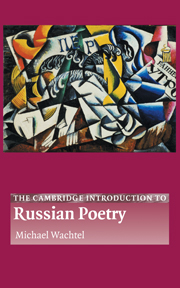Book contents
- Frontmatter
- Contents
- Preface
- Acknowledgments
- Note on translations and transliterations
- Introduction
- Part I Concepts
- Part II Interpretation
- Chapter 4 From the ode to the elegy (and beyond)
- Chapter 5 The ballad
- Chapter 6 Love poetry
- Chapter 7 Nature poetry
- Chapter 8 Patriotic verse
- Conclusion: poetry and pattern
- Bibliography
- Suggested further reading
- Index of poetic terms
- Index of names and works
Chapter 8 - Patriotic verse
Published online by Cambridge University Press: 05 June 2012
- Frontmatter
- Contents
- Preface
- Acknowledgments
- Note on translations and transliterations
- Introduction
- Part I Concepts
- Part II Interpretation
- Chapter 4 From the ode to the elegy (and beyond)
- Chapter 5 The ballad
- Chapter 6 Love poetry
- Chapter 7 Nature poetry
- Chapter 8 Patriotic verse
- Conclusion: poetry and pattern
- Bibliography
- Suggested further reading
- Index of poetic terms
- Index of names and works
Summary
Ру́сь моя́! Жена́моя́! Добо́ли
Нам я́сен до́лгий пу́ть!
Блок,«На по́леКулико́вом»My Russia! My wife!
The long path is painfully clear to us!
Blok, “On the Kulikovo Field”Virtually all national literatures have poems on patriotic themes, but the Russian tradition is particularly extensive. To some extent this can be attributed to the influence of patronage systems that have so frequently put the Russian poet in the position of supplicant. However, despotic autocrats and their illegitimate communist progeny by no means account for the full range of this phenomenon. For reasons both cultural and philosophical, Russian poets have often proudly viewed their language as inextricably linked to their country, using artistic achievement to compensate for – or even overcome – the backwardness of the society as a whole. Patriotic verse, then, does not always entail flattery of a monarch and the ruling interests; it can also present with unfeigned praise natural beauty, the common man, the national spirit. Many great Russian poets have contributed to this genre, making it significant politically, sociologically, and artistically.
Vasily Trediakovsky, one of the creators of Russian secular poetry, spent the years 1727–1730 studying in Paris. All evidence suggests that he enjoyed himself immensely, but, as his «Стихи́ похва́льные Росси́и» (“Verses in Praise of Russia”) indicate, the pleasures of the French capital did not diminish his patriotic zeal.
Начну́ на фл́ейте стихи́печа́льны,
Зря́ наРосси́ю чрез стра́ны да́льны:
Ибо все днесь мне еёдобро́ты
Мы́слить умо́м есть мно́го охо́ты.[…]
- Type
- Chapter
- Information
- The Cambridge Introduction to Russian Poetry , pp. 127 - 145Publisher: Cambridge University PressPrint publication year: 2004

